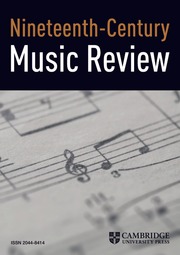No CrossRef data available.
Article contents
Introduction to the Special Issue on Ottocento Opera
Published online by Cambridge University Press: 26 April 2011
Extract
In the early 1960s a PhD candidate at Princeton University informed his professors that he wished to write a dissertation on the operas of Gioachino Rossini. He was pointedly discouraged from doing so and told that, if he wished to be taken seriously in musicology, he should focus on worthwhile repertory such as Renaissance music or works by nineteenth-century German composers. The student persisted in his purpose and, with his groundbreaking dissertation, set the study of ottocento opera on a solid trajectory. That student was Philip Gossett. Recently, at a gala event celebrating Philip's ‘retirement’, many of us who have focused our scholarship on this repertory were reminded about the evolution of the study of nineteenth-century Italian opera during the past 50 years.
- Type
- Articles
- Information
- Copyright
- Copyright © Cambridge University Press 2010
References
1 Founded by the Pesaro City Council on 4 April 1869 (very shortly after Rossini's death), as a result of the composer's bequest of his wealth to the municipality, the funded organization initially established a ‘Liceo Musicale’. In 1940, this became the ‘Conservatorio Statale di Musica’, and the administrative body became the ‘Fondazione Rossini’, with the purpose of sustaining Rossini's legacy.
2 A useful overview of the history of the Verdian institutions can be found in Harwood, Gregory preface to his Giuseppe Verdi: A Guide to Research (New York and London: Garland, 1998): xiii–xviii.Google Scholar
3 Verdi Forum was first published as AIVS Newsletter, later became Verdi Newsletter and is currently the refereed journal Verdi Forum, issued sporadically.
4 The Donizetti Society Journal began in 1974 and has been published periodically, the most recent issue (no. 7) released in 2002.


